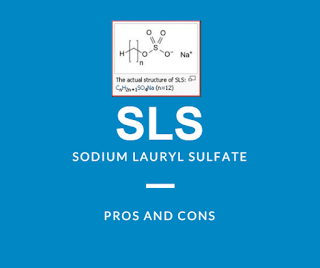Pros And Cons Of Sodium Lauryl Sulfate In Mouthwash
Sodium lauryl sulfate is present in the composition of many products for oral hygiene, including mouthwash and. Some might suggest that However, many of the popular mouthwashes also contain sodium lauryl sulfate (e.g., Listerine).
 |
| Pros And Cons Of Sodium Lauryl Sulfate In Mouthwash |
Pros and cons of sodium lauryl sulphate mouthwash.
Check out some of the pros and cons of sodium lauryl sulphate containing mouthwash that you use. Should you use it or not? Figure it out below.Pros Of Sodium Lauryl Sulfate
✔Sodium lauryl sulfate (SLS) or sodium dodecyl sulfate (SDS) — sodium salt euryceros acid, anionoactiva surfactant. Is an amphiphilic substance used in industry as a strong cleaning and wetting agents, machine oils, in the manufacture of most detergents, shampoos, toothpaste, cosmetics for the formation of foam.
✔Used as a powerful detergent in industry, pharmacology, cosmetology. The most common surfactant, frequently in combination with various mixtures, such as Avirol and others. It is included in most cleaning formulations, including, in many toothpastes, shampoos, as it provides a cheap and effective foaming and cleansing.
✔Belongs to irritant but not a carcinogen.
✔It is best to use the mouthwash for oral cavity not less than an hour after brushing with toothpaste if the toothpaste also contains the LSN, since the anionic compounds in such pastes can deactivate the action of the cationic agents in the composition of the mouthwash.
Cons Of Sodium Lauryl Sulfate
✘ According to experts Cosmetic Ingredients Review (the organization dedicated to verification of the safety of cosmetic ingredients), sodium lauryl sulfate and the related ammonium lauryl sulfate at a concentration of 2 % cause skin irritation in experimental animals and some people. Irritant effect of these ingredients increases with their concentration and time of contact with the skin. So prolonged use of detergents with sodium lauryl sulfate (or ammonium) may lead to the development of skin dryness, flaking, hair loss, formation of comedones.
✘It is known that sodium lauryl sulfate (LSN) causes the development of aphthous stomatitis (ulcers in the mouth) in people with a predisposition to this disease.
✘Sodium lauryl sulfate can seriously worsen skin problems in patients with atopic dermatitis.
✘As a component of toothpaste can cause stomatitis and the emergence of the AFL. Using toothpastes without sodium lauryl sulfate can reduce ulcers.
✘It is shown that sodium lauryl sulfate irritates the skin only with prolonged exposure (over an hour).











Thank you for sharing that great information.
ReplyDeleteAlso, find about Sodium Lauryl Sulphate Suppliers who offers the best quality Sodium Lauryl Sulphate In Bulk ranges.